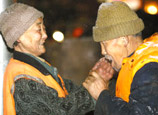
 |
| Whooper swans spend the winter at the coastal wetlands of Rongcheng, Shandong province. (China Daily/Ju Chuanjiang) |
Thousands of swans winter in the coastal wetlands of Shandong each year, and every effort is exercised to make sure these migratory birds have a comfortable refuge. Han Bingbin visits the swan lakes.
Some of China's rare lagoons lie along the relatively unpolluted coastline from Weihai to Rongcheng in Shandong province. Thousands of whooper swans migrate across borders for their annual winter stay here, attracted by the good supply of fresh water and aquatic plants, as well as sparsely populated coastal plains.
These lagoons with their winter population of swans have earned Rongcheng fame as the "home of swans".
An estimated 8,000 swans set up home each year at the wetlands here, for about five months from November to April, after which they fly back to Siberia and Mongolia for the breeding season. In the following years, some of them may make the return journey with their cygnets.
This year, two of the swans that had been previously tagged returned again to Rongcheng, and one has been returning for at least six years.
With encroaching urbanization, there have been tangible fears that the environmentally sensitive birds may face threats to their wintering habitats.
To ensure that the birds will never run short of good fresh water, the local government has embarked on a determined campaign to preserve their quality of life. Landfills nearby were shutdown, and three water-treatment and sewage plants established.
The attention to details has been extended even to controlling the amount of dust in the air, and unsurfaced mud tracks have been resurfaced.
In addition, a group of cleaners is employed to make sure that litter and waste left by sightseers are disposed of, and do not threaten the swans' safety.
High voltage cables that used to entangle and kill the swans in flight are now buried underground. The government even promises to compensate villagers whose wheats are eaten by the swans.
In fact, everything that can be done has been done to make sure the swans are safe, settled and happy.
Having said that, there are some threats that seem to be beyond the government's most enthusiastic efforts. One problem is the slow but inexorable disappearance of eel grass, one of the swans' favorite staples.
The seaweed's decline has started from the 1970s, with the rapid expansion of shrimp farming.

















 Sanitation worker, environmental protector in city
Sanitation worker, environmental protector in city


![]()
